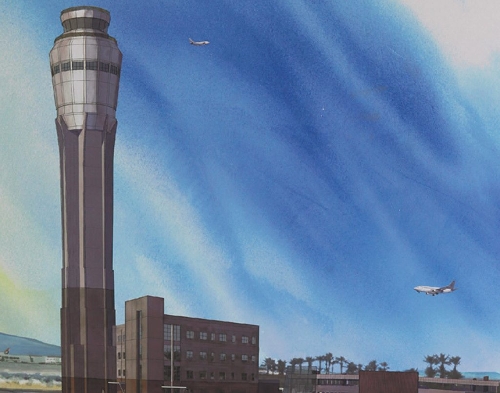Compromise deal to end FAA shutdown
WASHINGTON -- Construction of a new air traffic control tower at McCarran International Airport might soon resume after leaders in Congress agreed Thursday to end a partial shutdown of the Federal Aviation Administration.
Work on the $43 million Las Vegas project began in June but stopped after the FAA's legal authority to operate expired on July 23.
The FAA had furloughed nearly 4,000 federal workers and stopped work on nearly 250 construction projects that provided jobs to as many as 70,000 people across the country.
"They are going back to work Monday," Transportation Secretary Ray LaHood said during an interview on CNN on Thursday night.
Senate Majority Leader Harry Reid, D-Nev., issued a statement Thursday afternoon saying that a deal had been reached to end the impasse.
"I am pleased to announce that we have been able to broker a bipartisan compromise between the House and the Senate to put 74,000 transportation and construction workers back to work," Reid said.
John Yusunas, southwest district manager for McCarran tower subcontractor Anderson Drilling, said depending on when he gets a directive, "we will go (back to work) as soon we can assemble our crew back."
He was forced to pull a 15-person crew off a five-week job of drilling the deep foundation for the 352-foot control tower, which will be nearly double the height of the existing tower.
THE DEAL
Congress has failed to approve a long-term FAA funding bill since 2007, when the last one expired. Instead, they have approved 20 short-term extensions.
House Republicans last month pushed through another short-term extension but included a provision to eliminate
$16.5 million in air service subsidies to 13 rural communities, including Ely. Senate Democrats objected, and gridlock ensued.
The impasse threatened to keep the FAA and construction workers off the job for at least a month as Congress took its traditional August recess.
"This agreement does not resolve the important differences that still remain. But I believe we should keep Americans working while Congress settles its differences, and this agreement will do exactly that," Reid said.
Under the deal, the Senate this morning will approve the House-passed bill through a "unanimous consent" procedure that will not require members to return for a vote.
LaHood is expected to use his "waiver authority" to nullify the $16.5 million cut to the Essential Air Service program.
Mike Coster, manager of the Ely airport, said in an interview earlier this week that the subsidy is "hugely valuable for the economy of the county."
Without the subsidy, there would be no commercial air service to the remote area, which lacks any commercial bus or train service. The closest neighboring airport is 237 miles away in Salt Lake City.
The federal government spends about $1.8 million to subsidize the daily service between Ely and Las Vegas, which averages about three passengers each way on the 19-seat commercial aircraft.
President Barack Obama, who had scolded Congress on Wednesday for not solving the standoff, expressed relief.
"I'm pleased that leaders in Congress are working together to break the impasse involving the FAA so that tens of thousands of construction workers and others can go back to work," Obama said in a statement. "We can't afford to let politics in Washington hamper our recovery, so this is an important step forward."
LABOR PROVISION HURDLE
Both the House and Senate passed long-term funding bills for the FAA earlier this year, but negotiations on resolving differences and finalizing those bills are stalemated. The biggest holdup is a labor provision in the House long-term bill.
Republicans want to overturn a National Mediation Board rule approved last year that allows airline and railroad employees to form a union by a simple majority of those voting. Under the old rule, workers who didn't vote were treated as "no" votes.
"The House has made it clear that the anti-worker piece is a priority for them, and they also put us on notice that they don't intend to give in. So we are bracing for a new fight in September," said Vince Morris, a spokesman for Sen. Jay Rockefeller, D-W.Va., chairman of a committee that oversees the FAA.
Last month, in comments to the House Rules Committee and separately to reporters, Rep. John Mica, R-Fla., the chairman of the House Transportation and Infrastructure Committee, said the labor provision was the only issue standing in the way of the House and Senate reaching an agreement on a long-term FAA bill.
The subsidy cuts, Mica said, were designed to force the Senate to act.
Democrats said they worried that if they give in to Republicans on relatively small items like the subsidy cuts, Republicans will be encouraged to demand concessions on the next extension bill, such as the labor provision.
Democrats and union officials say the proposed labor change puts airline and railroad elections under the same democratic rules required for unionizing all other companies. But Republicans say the new rule reverses 75 years of precedent to favor labor unions.
The GOP labor provision has the backing of the airline industry. The biggest beneficiary would be Delta Air Lines, the largest carrier whose workers aren't primarily union members.
The Associated Press contributed to this report. Contact Stephens Washington Bureau reporter Peter Urban at purban@stephensmedia.com or 202-783-1760.


















